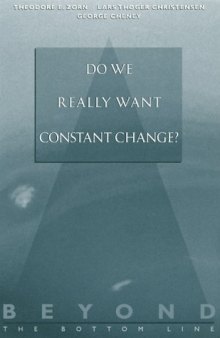 جزییات کتاب
جزییات کتاب
Summary Do We Really Want Constant Change explores the human and organizational consequences of our infatuation with change and recommends ways to balance the opposing, but equally valuable, forces of change and stability. ------------------------------------------------------------------------ Description Change has become an end in itself, not a means to an end. Obviously there is a need for change. Organizations need to adapt to new circumstances and to prepare for anticipated future conditions. But, argue the authors of this provocative new Beyond the Bottom Line booklet, change and flexibility have become "god terms"-terms that are accepted unquestioningly as good. All you have to do is invoke them and you can gain the ready assent of others. This happens every time a new change strategy comes along-TQM, reengineering, business process outsourcing, etc. Often the old strategy is dropped-whether or not it's shown results-and the new one is embraced, simply because it's the latest, presumably best, way to maintain the sine qua non of modern management: constant change. The rush to change has become so fast, so heated, and so unthinking in many cases that we rarely have time to reflect on exactly what it is we're trying to accomplish. And organizations often overlook the fact that fact that constant change comes at a price-not just in money spent on consultants and seminars and training materials, but also in time, energy, and employee morale. A price that often outweighs the theoretical benefits.



 دانلود کتاب
دانلود کتاب

 جزییات کتاب
جزییات کتاب





 این کتاب رو مطالعه کردید؟ نظر شما چیست؟
این کتاب رو مطالعه کردید؟ نظر شما چیست؟
